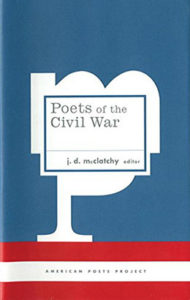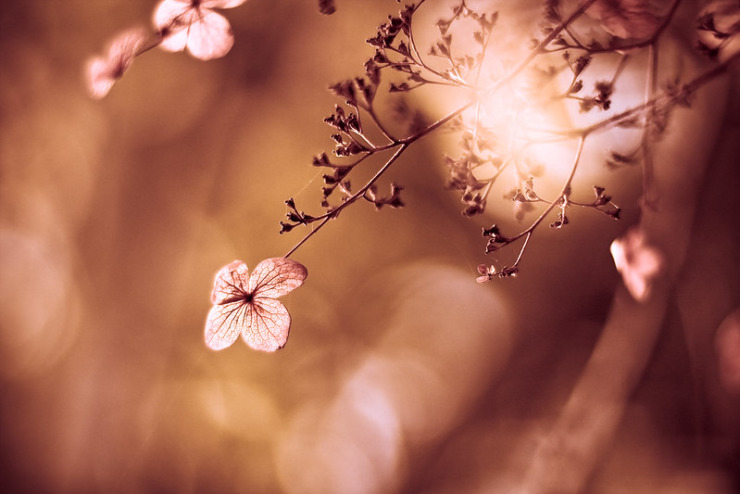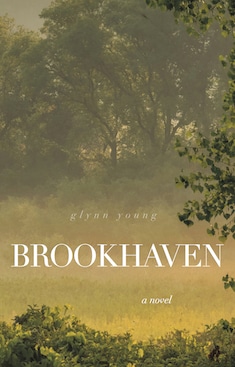“Poets of the Civil War” by J.D. McClatchy is a small volume with a big subject
If I asked you to give me the name of an American Civil War poet, you would likely say “Walt Whitman.” His poems, like “When Lilacs Last in the Dooryard Bloom’d,” “The Wound Dresser,” and “O Captain! My Captain!” certainly catapult him to the top of the Civil War poets list.
But if I were asked to name another Civil War poet, I’d be rather stumped. Until, that is, I laid eyes on Poets of the Civil War, edited by J.D. McClatchy, published in 2005 as part of the Library of America’s American Poets Project. And I was in for a major surprise. Whitman doesn’t stand there by himself.
The list of Civil War poets includes some of the best-known writers and poets of the 19th century. William Cullen Bryant. Ralph Waldo Emerson. Henry Wadsworth Longfellow. John Greenleaf Whittier. Herman Melville. James Russell Lowell. Bret Harte. Ambrose Bierce. Sidney Lanier.
Did you know that Emily Dickinson was a Civil War poet? I didn’t, but I learned she wrote several war poems.
Henry Howard Brownell so impressed Admiral David Farragut with his realistic war poems that Farragut invited him to witness the Battle of Mobile Bay. His longish poem “The Bay Fight” is considered as accurate an account of the battle as any newspaper or official report.
Poets lesser known today but popular during the time have their place as well. They include Margaret Junkin Preston, Thomas Buchanan Read (with his thrilling” Sheridan’s Ride”), Frances Ellen Watkins Harper, Ethel Lynn Beers, Henry Timrod, Fitz-James O’Brien, and Kate Brownlee Sherwood, among others.
Editor McClatchy, in an extremely well-done and perceptive introduction, explains what these poets wrote about. It wasn’t all about battles. They wrote about soldiers writing letters home, the wounded and dying, their reflections in cemeteries, the work of an army sentry, slavery, and the home front. As McClatchy points out, the poems of the Northern writers reflected a sense of mission and crusade; those of the Southern writers were more about chivalry and honor. The Civil War was a clash of two civilizations and two ways of life, and the poems mirrored that titanic battle.
The writer Herman Melville read the reports of the Battle of Shiloh in 1862. While it eventually became known as a Union victory, it was unclear which side had really won – the carnage and devastation were awful for both North and South. What struck Melville was that part of the battle was fought around Shiloh Church (which gave the overall battle its name). The irony of death and destruction adjacent to a church whose name meant “heavenly peace” was not lost on the poet.
Shiloh: A Requiem

The swallow fly low
Over the field in clouded days,
The forest-field of Shiloh—
Over the field where April rain
Solaced the parched ones stretched in pain
Through the pause of night
That followed the Sunday fight
Around the church of Shiloh—
The church so lone, the log-built one,
That echoed to many a parting groan
And natural prayer
Of dying foemen mingled there—
Foemen at morn, but friends at eve—
Fame or country least their care:
(What like a bullet cab undeceive!)
But now they lie low,
While over them the swallows skim,
And all is hushed at Shiloh.
“The Battle Hymn of the Republic” by Julia Ward Howe is included in the collection, but it’s technically not a poem. Howe wrote the lyrics set to the tune of “John Brown’s Body,” and she wrote it to be a song. It does fit, however, with the idea of mission or crusade.

J.D. McClatchy
McClatchy (1945-2018) published numerous collections of poetry and essays. His 2002 collection, Hazmat, was nominated for the Pulitzer Prize, and his 1989 collection of essays, White Paper, received the Melville Cane Award from the Poetry Society of America. He edited Edna St. Vincent Millay: Selected Poems, the first volume in the American Poets Project. McClatchy was also a librettist, critic, and teacher, having taught for a long time at Yale University.
There’s much to like and enjoy with Poets of the Civil War, first published in 2005. McClatchy included poets from both sides, but the weight is poets of the North, reflecting the Union’s more literary culture. The poems address battles and events, but they also address the experiences of the civilians and soldiers who lived through it. And the collection, even as short as it is with only 200 pages, depicts the magnitude of a war whose effects we are still experiencing.
Related:
O Captain! My Captain! read by Tom O’Bedlam
Poetry and Remembering the Civil War: Allen Tate
Poetry and Remembering the Civil War: Robert Lowell
Poetry and Remembering the Civil War: Walt Whitman
Photo by Harold Lloyd, Creative Commons, via Flickr. Post by Glynn Young.
How to Read a Poem uses images like the mouse, the hive, the switch (from the Billy Collins poem)—to guide readers into new ways of understanding poems. Anthology included.
“I require all our incoming poetry students—in the MFA I direct—to buy and read this book.”
—Jeanetta Calhoun Mish
- Poets and Poems: Donna Vorreyer and “Unrivered” - October 7, 2025
- Poet Sidney Lanier and the Lost Cause - October 2, 2025
- Poets and Poems: A.J. Thibault and “We Lack a Word” - September 30, 2025



Leave a Reply